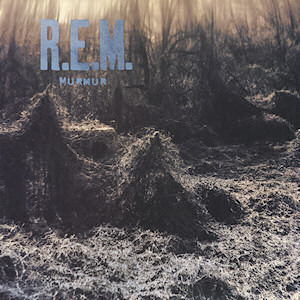
Murmur is the debut studio album by American alternative rock band R.E.M., released on April 12, 1983 by I.R.S. Records. Murmur drew critical acclaim upon its release for its unusual sound, defined by lead singer Michael Stipe's cryptic lyrics, guitarist Peter Buck's jangly guitar style, and bass guitarist Mike Mills' melodic basslines.

"Losing My Religion" is a song by the American alternative rock band R.E.M. The song was released as the first single from the group's 1991 album Out of Time. Built on a mandolin riff, "Losing My Religion" was an unlikely hit for the group, garnering extensive airplay on radio as well as on MTV and VH1 due to its critically acclaimed music video. The song became R.E.M.'s highest-charting hit in the United States, reaching No. 4 on the Billboard Hot 100 and expanding the group's popularity beyond its original fanbase. At the 1992 Grammy Awards, "Losing My Religion" won two awards: Best Short Form Music Video and Best Pop Performance by a Duo or Group with Vocal.

Monster is the ninth studio album by American rock band R.E.M., released on September 27, 1994, by Warner Bros. Records. Produced by the band and Scott Litt and recorded at four studios, the album was an intentional stylistic shift from R.E.M.'s previous two albums Out of Time (1991) and Automatic for the People (1992), with loud, distorted guitar tones and simple arrangements. Michael Stipe's lyrics at times deal with the nature of celebrity, and some are sung from the viewpoint of a character.
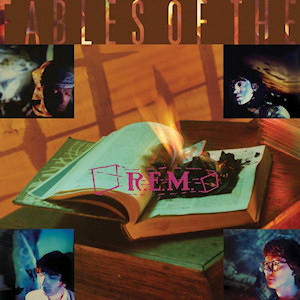
Fables of the Reconstruction, also known as Reconstruction of the Fables, is the third studio album by American alternative rock band R.E.M., released on I.R.S. Records on June 10, 1985. The Joe Boyd-produced album was the first recorded by the group outside the United States. It is a concept album with Southern Gothic themes and characters.

Lifes Rich Pageant is the fourth studio album by the American alternative rock band R.E.M., released on July 28, 1986. R.E.M. chose Don Gehman to produce the album, which was recorded at John Mellencamp's Belmont Mall Studios in Belmont, Indiana. This was the only album the band recorded with Gehman, who moved them from the more obscure and dense sound of their earlier albums to an accessible, hard rock-influenced quality. The album was well-received critically.

New Adventures in Hi-Fi is the tenth studio album by the American alternative rock band R.E.M. It was their fifth major-label release for Warner Bros. Records, released on September 9, 1996, in Europe and Australia, and the following day in the United States. New Adventures in Hi-Fi was the last album recorded with founding member Bill Berry, original manager Jefferson Holt, and long-time producer Scott Litt. The members of R.E.M. consider the recorded album representative of the band at their peak, and fans generally regard it as the band's last great record before a perceived artistic decline during the late 1990s and early 2000s. It has sold around seven million units, growing in cult status years after its release, with several retrospectives ranking it among the top of the band's recorded catalogue.

"Orange Crush" is a song by the American alternative rock band R.E.M. It was released as the first single from the band's sixth studio album, Green, in 1988. It was not commercially released in the U.S. despite reaching number one as a promotional single on both the Mainstream and Modern Rock Tracks. It peaked at number 28 on the UK Singles Chart, making it the band's then-highest chart hit in Britain, where they promoted the song by making their debut appearance on Top of the Pops.

"What's the Frequency, Kenneth?" is a song by American alternative rock band R.E.M. from their ninth studio album, Monster (1994). The song's title refers to an incident in New York City in 1986, when two then-unknown assailants attacked journalist Dan Rather, while repeating "Kenneth, what is the frequency?"
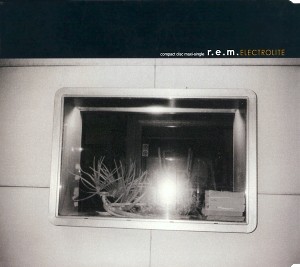
"Electrolite" is a song by R.E.M. released as their third single and closing track from their tenth studio album, New Adventures in Hi-Fi. The song is a piano-based ballad to Los Angeles, Hollywood icons and the closing 20th century. Initially, Michael Stipe objected to including the song on the album, but was won over by Peter Buck and Mike Mills. It has since become one of his favorite R.E.M. songs as well as one of Radiohead lead singer Thom Yorke's; Radiohead has covered the song.

"Radio Free Europe" is the debut single by American alternative rock band R.E.M., released in 1981 on the short-lived independent record label Hib-Tone. The song features "what were to become the trademark unintelligible lyrics which have distinguished R.E.M.'s work ever since." The single received critical acclaim, and its success earned the band a record deal with I.R.S. Records. R.E.M. re-recorded the song for their 1983 debut album Murmur. The re-recording for I.R.S. became the group's first charting single, peaking at number 78 on the Billboard Hot 100 chart. The song is ranked number 389 in Rolling Stone's 500 Greatest Songs of All Time. In 2010, it was added to the Library of Congress's National Recording Registry for setting "the pattern for later indie rock releases by breaking through on college radio in the face of mainstream radio's general indifference." The song was featured in the 1984 movie The Party Animal.

"Stand" is a song by the American alternative rock band R.E.M., released as the second single from the album Green in 1989. The song peaked at number six on the Billboard Hot 100, becoming R.E.M.'s second top 10 hit in the United States, and topped both the Mainstream Rock Tracks and Modern Rock Tracks charts. The song reached number 48 on the UK Singles Chart and number 16 in Canada. It was placed on R.E.M.'s Warner Bros. Records "best of" album In Time: The Best of R.E.M. 1988–2003 in 2003, as well as the 2011 compilation album Part Lies, Part Heart, Part Truth, Part Garbage.
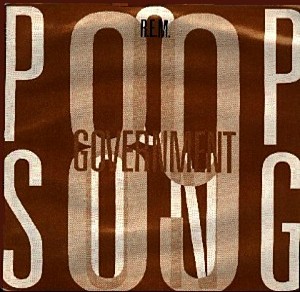
"Pop Song 89" is the opening track and third single released from R.E.M.'s sixth studio album Green. It peaked at number 86 on the Hot 100, and in the UK "Stand" was re-released instead.
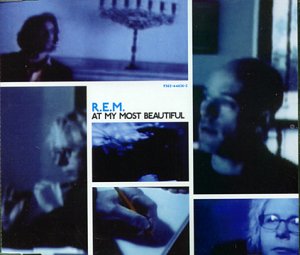
"At My Most Beautiful" is a song by the American alternative rock band R.E.M. During the song's creation, members of the group noted its similarity to the work of the Beach Boys and purposefully fashioned it to resemble that band's output. Singer Michael Stipe strove to make his lyrics the most romantic he had ever written, and the piano-driven ballad became R.E.M.'s first straightforward love song. Released on the group's 1998 album Up, it was issued as the third single from that record the following year, reaching number 10 on the UK Singles Chart.

"Texarkana" is a song from R.E.M.'s studio album Out of Time. Though not released as an official single, it managed to chart at number 4 on the Modern Rock Tracks chart and number 6 on the Mainstream Rock Tracks chart. This song was written, musically and lyrically, by bassist Mike Mills, as vocalist Michael Stipe had been having problems for weeks trying to come up with lyrics for it. As a result, Mills also sang lead vocals.

R.E.M. Live is a live album from R.E.M., recorded at the Point Theatre, Dublin, on February 26 and 27, 2005, the closing nights of the winter European leg of the Around the World Tour in support of their thirteenth studio album Around the Sun released in late 2004. It was released in the United Kingdom on October 15, 2007 and in the United States a day later as a two-Compact Disc audio set and a DVD, then released in February 2008 as a triple vinyl set. The performance was filmed by Blue Leach, who also directed Depeche Mode's Touring the Angel: Live in Milan.

R.E.M. was an American rock band from Athens, Georgia, formed in 1980 by drummer Bill Berry, guitarist Peter Buck, bassist Mike Mills, and lead vocalist Michael Stipe, who were students at the University of Georgia. Liner notes from some of the band's albums list attorney Bertis Downs and manager Jefferson Holt as non-musical members. One of the first alternative rock bands, R.E.M. was noted for Buck's ringing, arpeggiated guitar style; Stipe's distinctive vocal quality, unique stage presence, and obscure lyrics; Mills's melodic bass lines and backing vocals; and Berry's tight, economical drumming style. In the early 1990s, other alternative rock acts such as Nirvana and Pavement viewed R.E.M. as a pioneer of the genre. After Berry left the band in 1997, the band continued its career in the 2000s with mixed critical and commercial success. The band broke up amicably in 2011 with members devoting time to solo projects after having sold more than 85 million albums worldwide and becoming one of the world's best-selling music acts.

Live at The Olympia is a live album by American alternative rock band R.E.M.. It was recorded during the band's five-night residency at the Olympia Theatre, Dublin, between June 30 and July 5, 2007, and released on October 27, 2009. In this series of "working rehearsals" the songs on Accelerate were debuted, with many still works in progress. The album is a two-CD release, and contains a total of 39 songs. In addition, a DVD with a documentary entitled This Is Not a Show directed by Vincent Moon is included. A special edition box set containing the album on four LPs as well as the two CDs and the DVD is also available.

R.E.M. Live from Austin, TX is a 2010 video album by R.E.M. recorded on March 13, 2008, 18 days before the release of their album Accelerate, for the television series Austin City Limits. The DVD released includes three songs not broadcast on the television program—"So. Central Rain ", "Fall on Me", and "Imitation of Life"; the live performance also featured "Final Straw", "Walk Unafraid", and an alternate version of "Supernatural Superserious". The television broadcast aired on PBS starting March 24, 2008.

Unplugged: The Complete 1991 and 2001 Sessions is a 2014 live album from alternative rock band R.E.M., released initially on vinyl recordings through Rhino Records for Record Store Day, later made available on compact disc and digitally. The album is composed of two performances that the band made on the U.S. television show MTV Unplugged. Among the album's 33 tracks are 11 performances which were not aired on either broadcast. To promote the album, Mike Mills signed copies at independent record store Bull Moose in Scarborough, Maine. Video of the concerts was released later that year on REMTV.

Green is the sixth studio album by American rock band R.E.M., released on November 7, 1988 by Warner Bros. Records. Produced by the band and Scott Litt, it continued to explore political issues both in its lyrics and packaging. The band experimented on the album, writing major-key rock songs and incorporating new instruments into their sound including the mandolin, as well as switching their original instruments on other songs.




















